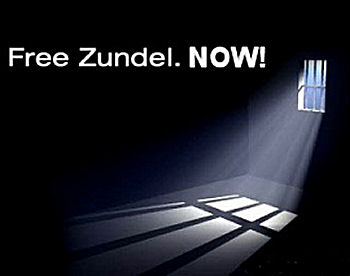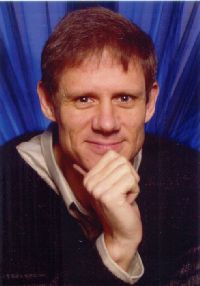| Breaking news from freedom's front line
The Trial of Germar Rudolf in Mannheim District Court
Day 3. December 4, 2006
Reported by Günter Deckert
Translated from the German by J. M. Damon
Scheduled for 9 o’clock, the session began at 9:14am
Present were:
1) The usual members of the Court with Judge Schwab presiding
2) District Attorney Grossmann
3) Both Attorneys for the Defense
4) One bailiff, five uniformed policemen (not all present at all times.) All were armed. In addition, two state security policemen - staschu - both of whom left at 9.52. Police presence was weaker than on preceeding days and now more polite and accommodating. The civil-war-like scenario of the early months of the Zündel trial re no longer in evidence. Do the powers that be realize they are not really dealing with “right wing terrorists?”
5) News media: none present (!?) Disinterested? Afraid to report?
6) Spectators: 39, including Dr. Rolf Kosiek of Grabert Publishing House in Tübingen.
Germar was again brought into the courthouse chained hand and foot, despite Judge Schwab’s assurances that he would not be chained in his courtroom. The government is clearly doing all it can to create the impression that Germar is a violent and desperate criminal. Attorney Bock stated that he was going to contact the Justice Ministry in Stuttgart.
Judge Schwab allowed Germar to continue stating his case. Germar continued speaking on the subject of science and free scientific inquiry, stressing the philosophy of Karl Popper.
Much of Germar’s presentation today, which can be mentioned here only in very abbreviated form, can be found in his Kardinalfragen an Deutschlands Politiker (Cardinal Questions for Germany’s Politicians) available online at www.vho.org/D/kadp/
Germar addressed the problems of prejudice and dogmatism in historiography, that is, the anti-scientific practice of disallowing all criticism, disallowing the presentation of empirical or forensic evidence, disallowing unofficial opinions, etc. To emphasize his point, he provided numerous vivid examples. He contrasted this approach of the traditional “court historians” to the approach of the Revisionists. Not only do Revisionists conduct specific critiques of their own sources, they also invite scientific criticism and analysis of their arguments.
At 10:05 Judge Schwab recessed court, which reconvened at 10:38.
At this time Germar addressed himself to discussing expressions that contain the word Sonder (special) whose meanings in particular compounds are often misunderstood and misconstrued , (as in Sonderbehandlung, “special treatment.”)
He described the forensic investigations carried out by Carlo Mattogno who, in contrast to established “Holocaust” researchers such as Rückerl, Langbei, Kogon (authors of articles such as Mass Murders Carried Out by National Socialists Using Poison Gas or similar titles), has always proceeded in a rigorously systematic and scientific manner.
He pointed out that “Holocaust” historians’ attacks on Revisionism are hardly ever directed at their work, but rather at their persons ( the fallacy of ad hominem). “Establishment” historians slander and ridicule Revisionist researchers in order to detract from the significance of their findings, which they decline to discuss.
In this regard Germar described his own indictment as unscientific and irrational. He mounted a spirited attack against Dr. Meinerzhagen, the presiding judge in the Zündel trial, who in a separate ruling on the validity of his arrest, ruled that Germar’s publications could not be taken seriously because they contained political and religious points of view. Germar called Meinerzhagen’s conduct “shameless and absurd.”
Germar next gave his definition of the Unter Wissenschaft (under scientific norms.) Following this he spoke about the legal ramifications of his own trial, comparing it with events in a historic trial he named only at the end of his speech. He described both trials as political trials and witch burnings, again making his points very effectively.
When he finally “let the cat out of the bag,” the comparison was with Alexander Solzhenitsyn’s trial as described in his Gulag Archipelago. The parallels between the two trials were unmistakable. The revelation had a noticeable effect on the female lay jurist as well as District Attorney Grossmann who was nervously fidgeting with his ballpoint pen during this time. Germar observed that the Court understands exactly what is expected of it from “on high” and will act accordingly.
He then referred to actions of the Mannheim District Court, headed by Dr. Müller and Dr. Orlet, against Günter Deckert (author of this report.) The verdict of that trial released a “worldwide wave of repulsion and resentment” over corruption and repression in the German court system.
Germar observed that although the “BRDDR” claims that there are no political prisoners in Germany, it is very obvious that the opposite is true. (“BRDDR,” an acronym of BRD/DDR coined by this reporter, refers to the two German vassal states (“East Germany” and “West Germany”) created by the victors of World War II, pitted against each other during the Cold War and combined into one vassal state in 1990. The German nation is much greater than the “BRDDR”, however.)
In conjunction with the court system’s hypocrisy in claiming there are no political prisoners in Germany, Germar moved on to the question of human rights and the deutschen Sonderweg or Germany’s “peculiar path” as exemplified in the repressive, anti-free speech Paragraph 130 of the Basic Law, which deals with “Incitement of the Masses.”
In addition to the repression inherent in this “peculiar path”, the rights of the accused are obliterated by the equally peculiar principle of Offenkundigkeit (“Manifest Obviousness”).
Germar then mounted a sharp attack against the BVerfG (Bundesverfassungsgericht, Germany’s so-called “Constitutional Court”), just as he had done with the definition of the scientific concept. Subsequently this brought on a reprimand by Judge Schwab.
The Court recessed for noon at 12:30 and resumed at 1:45 pm
Germar continued with his depiction of the erosion of human rights in the “BRDDR,“ specifying the incessant erosion of individual freedoms and pointing out the instruments used by the government to pry them away. He pointed out how the Cold War and RAF (“Red Army Faction) terrorists played a pioneering role in this erosion.
Germar referred specifically to the lex Engelhardt of 1985 (the “Engelhardt Law” was named after a well known defense attorney in Nuremberg.)
The crime of “Holocaust Denial” is classified as an Offizialdelikt, an offense for which proceedings are brought directly by the public prosecutor. This “crime” requires no indictment, and the prosecutor is required to proceed on his own initiative.
Germar then described the “Deckert – Leuchter Trial” that took place in 1992 and 1994 in Mannheim District Court and Karlsruhe District Court and led to an intensification of the repression inherent in Paragraph 130. The Deckert-Leuchter Trial (concerning this reporter) grew out of a lecture given by Fred A. Leuchter on his Auschwitz research (the Leuchter Expert Report) in Weinheim in Nov 1991, in which Deckert acted as simultaneous interpreter. From this came two additional trials before Mannheim District Court as well as a third trial in Karlsruhe District Court. As a result of this series of political trials, Deckert spent five years behind bars (8 Nov 1995 until end of Oct 2000) in Mannheim, Stuttgart-Stammheim, Heidelberg and the high security prison at Bruchsaler.
Germar pointed out that another indicator of intensified repression is the increase of the maximum penalty for “Holocaust denial” from three to five years imprisonment.
He also mentioned the increased surveillance, telephone bugging and attempts to outlaw the National Party, and noted that “Manifest Obviousness” implies official suppression of forensic evidence.
He then discussed the role played by so-called “Protection of Youth” and the Bundesprüfstelle für jugendgefährdende Schriften (Federal Oversight Office for Youth-Endangering Writings). As Professor of Political Science Jesse at Chemnitz University has pointed out, this has increasingly become a trapdoor for so-called “anti Fascism", that is, a political weapon of the tyrannical Left. Such “anti propaganda” laws as criminal offense are used only against the patriotic Right. In response to the unmistakable progressive decline of constitutional rights, Germar as a true scientist is obligated by Immanuel Kant’s “Categorical Imperative” to "act only according to that maxim which you would have as universal law.”
Germar then addressed the ever increasing incompatibility between freedom of scientific research (Articles 5 and 3 of Basic Law) and human rights (Article 1 of Basic Law.)
He reiterated the scientific maxim that the results of research must be based on verifiable evidence.
He noted that Holocaust propaganda, whether true or not, diminishes the Gemeinschaftsfähigkeit (capacity for socialization) of the coming generation.
He pointed out that since the 1970s, this has led to German youths’ societal estrangement, replacing vital social intercourse with a kind of generational introversion, “self-realization” and “navel-contemplation.” This has had disastrous consequences for German societal development, so that in 100 years there will be no recognizable German society remaining.
He observed that the government’s according sacred status to the so-called “Holocaust” reflects the utter lack of any cogent counter argument against the findings of Revisionist historians; and he described the present government’s conduct as “intellectual traumatizing” or brainwashing of the masses.
Germar observed that the “politically correct” forces opposing historical revisionism have unlimited money and influence.
They wield their political power mindlessly and utilize so-called “antifascist” elements as shock troops. Historical Revisionism or historical correctness (as opposed to political correctness) has nothing that corresponds to such brutal and repressive measures. The present government is attempting to marginalize historical revisionism it by neutralizing its leadership and isolating it from the mainstream.
Germar then informed Judge Schwab that he wished to move on to a different subject, and so the judge ended this day’s session at 2:48 pm.
The next court session will be on Wednesday, 6 December (Knecht Ruprecht or Nicholas’ Day) at 9am.
Summarizing remark by the reporter: Once again, Germar made a very resolute and dignified impression. He displayed no fear of the “Imperial Justice” of the “BRDDR” court although he knows he can expect no leniency.
Günter Deckert
A friendly request: whoever reads and circulates this report, please be so kind as to mention my name in conjunction with it. Thanks, G.D.
Ernst Zündel was sentenced at the Mannheim court on February 15th 2007 to five years imprisonment. For more on the Zundel case, click here.
 |
 |
|
 |
| Germar Rudolf |
|
|

